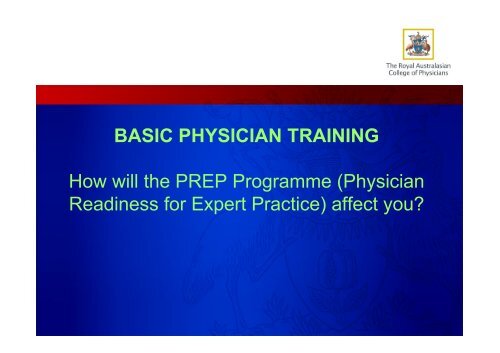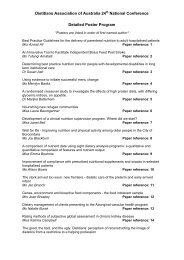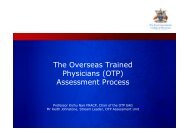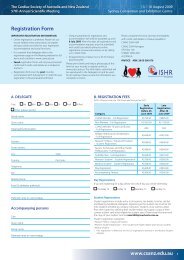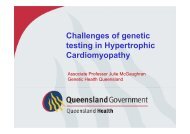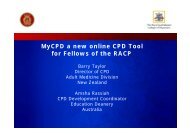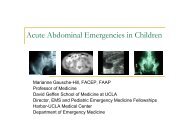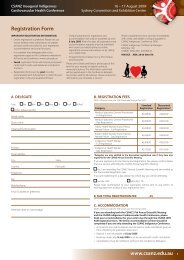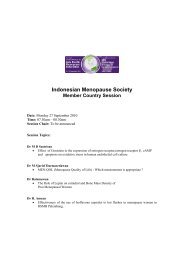BASIC PHYSICIAN TRAINING How will the PREP Programme ...
BASIC PHYSICIAN TRAINING How will the PREP Programme ...
BASIC PHYSICIAN TRAINING How will the PREP Programme ...
Create successful ePaper yourself
Turn your PDF publications into a flip-book with our unique Google optimized e-Paper software.
<strong>BASIC</strong> <strong>PHYSICIAN</strong> <strong>TRAINING</strong><br />
<strong>How</strong> <strong>will</strong> <strong>the</strong> <strong>PREP</strong> <strong>Programme</strong> (Physician<br />
Readiness for Expert Practice) affect you?
Overview:<br />
1. Basic Physician Training -<strong>the</strong> “<strong>PREP</strong>”<br />
program<br />
a. – aims, structure and requirements<br />
2. Focus on Mini-CEX
Why change Basic Training?<br />
International changes in educational<br />
philosophy (UK, US, Canada)<br />
Australian Medical Council (AMC) review
Changes in Educational Governance in RACP<br />
“Education Committees” have replaced <strong>the</strong><br />
Committees for Physician Training<br />
Similar role – both Basic and Advanced<br />
Training<br />
Implementing “<strong>PREP</strong>”<br />
Creation of an “Education Deanery”, based in<br />
Sydney – development of educational resources
<strong>PREP</strong> Program Structure – Training Duration<br />
Training duration – 36 months of accredited<br />
core and non-core clinical experience<br />
Similar to existing requirements<br />
Handbook updated (2008) – on line
<strong>PREP</strong> Program Structure – Curricula<br />
Published curricula – both clinical competencies<br />
and professional qualities
<strong>PREP</strong> Program Structure – Supervision<br />
Supervision<br />
Trainees progress <strong>will</strong> be monitored<br />
Regular meetings with an Educational<br />
Supervisor (DPT + …….)<br />
Educational Supervisors <strong>will</strong> complete<br />
regular progress reports
<strong>PREP</strong> Program Structure – Progress Reports<br />
Educational Supervisor’s report<br />
1-2 annually<br />
Run Supervisors reports<br />
At <strong>the</strong> end of each run<br />
Transitional year 2009 – no trainee <strong>will</strong> be<br />
disadvantaged
<strong>PREP</strong> Program Structure – Formative Assessment<br />
Regular “mini-CEX”<br />
<br />
15-minute observed snapshot of a<br />
focussed, clinical interaction<br />
(Multisource Feedback – <strong>will</strong> be evaluated for<br />
future use)
<strong>PREP</strong> Program Structure – Teaching and Learning Tools<br />
Learning Needs Analysis<br />
Completed by <strong>the</strong> trainee, discussed at<br />
Supervisor meeting – in current use<br />
Reflective Learning<br />
Significant Incident Analysis – future use
<strong>PREP</strong> Program Structure – E-learning
<strong>PREP</strong> Program Structure – Prospective Training<br />
Can enter <strong>PREP</strong> at PGY-2 level<br />
Likely only one year of retrospective credit <strong>will</strong><br />
be granted [“Recognition of Prior Learning”].
<strong>PREP</strong> Program Structure – Summative Assessment<br />
Written and Clinical Examination<br />
No major changes<br />
Require 24 months of accredited Basic<br />
Training prior to sitting <strong>the</strong> written exam.
Progression through Basic Training - envisaged
Progression through Basic Training (<strong>PREP</strong>) in 2009
Run Supervisors: Responsibilities<br />
Continue <strong>the</strong> excellent supervision and teaching that you have<br />
provided to Basic Trainees over many years, including<br />
appropriate feedback etc<br />
Carry out Mini-CEX with your Basic Trainee<br />
If required, complete a Progress Report at <strong>the</strong> end of <strong>the</strong> run,<br />
which <strong>the</strong> trainee <strong>will</strong> discuss with <strong>the</strong>ir DPT or Educational<br />
Supervisor
Continuum of Learning<br />
Formative Assessment: Mini - CEX<br />
15-minute observed snapshot of a focussed, clinical doctor/patient<br />
interaction<br />
Undertaken in normal clinical / workplace setting using actual<br />
patients<br />
1 every 6 months in 2009, across a range of specialty environments<br />
Assesses clinical skills, attitudes and behaviours eg:<br />
Medical interviewing skills (history taking)<br />
Physical examination skills<br />
Consideration for patient/professionalism<br />
Clinical judgement<br />
Counselling and communication skills<br />
Organisation / efficiency<br />
Overall clinical competence<br />
Structured “marking” sheet that covers pre-defined generic areas
Mini – CEX paper form
<strong>How</strong> does it work?<br />
<br />
Trainees identify opportunities to be observed by <strong>the</strong>ir Run<br />
Supervisor, using <strong>the</strong> Mini-CEX process (one each 6 months in NZ in<br />
2009)<br />
<br />
Observation may be about 15-20 minutes and feedback may take<br />
about 10-20 minutes<br />
<br />
The Trainee <strong>will</strong> keep <strong>the</strong> rating form, and <strong>will</strong> discuss this with <strong>the</strong>ir<br />
Educational Supervisor/DPT
Mini-CEX on a busy medical team…..


